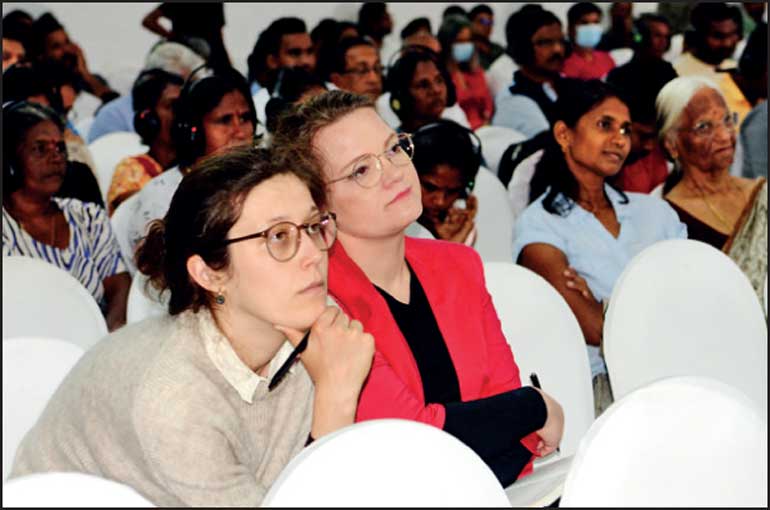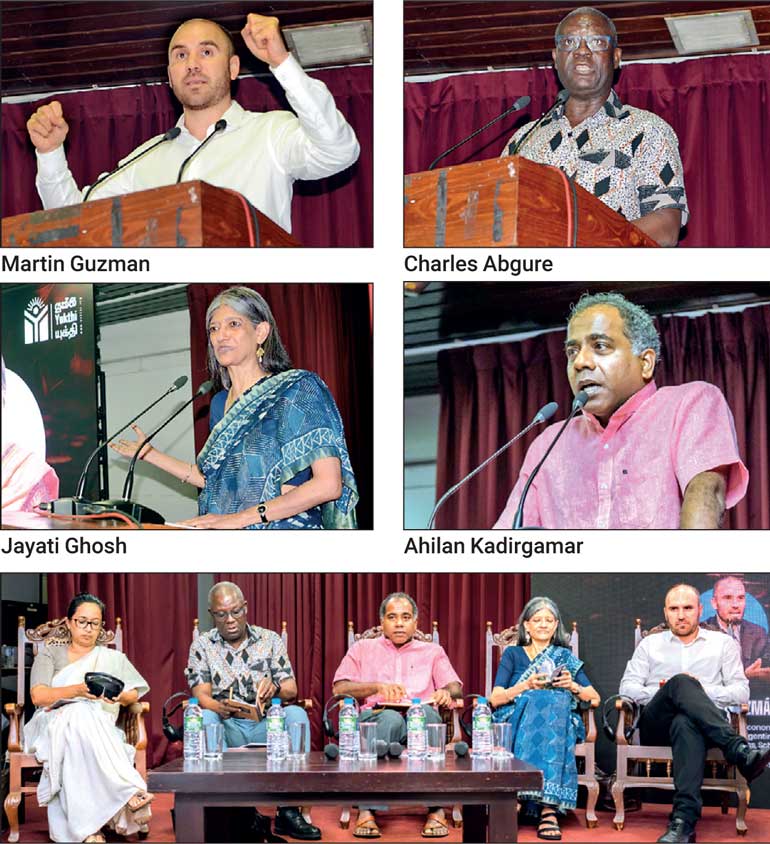Wednesday Feb 18, 2026
Wednesday Feb 18, 2026
Friday, 14 June 2024 00:02 - - {{hitsCtrl.values.hits}}


 International experiences on debt restructuring and negotiating with the International Monetary Fund (IMF) were shared with civil society, politicians and the media on 10 June at the Sri Lanka Foundation Institute in Colombo.
International experiences on debt restructuring and negotiating with the International Monetary Fund (IMF) were shared with civil society, politicians and the media on 10 June at the Sri Lanka Foundation Institute in Colombo.
The former Minister of Economy of Argentina, Professor Martín Guzmán, currently at Columbia University in New York, University of Massachusetts, Amherst economist and International Development Economics Associates (IDEAs) co-founder Professor Jayati Ghosh, and IDEAs Executive Director Charles Abugre made presentations at the seminar titled, ‘Is there another way? Debt restructuring, the IMF and the future of Sri Lanka’. This event is an initiative of the Yukthi Collective, a platform of activists and academics engaged in research and advocacy in support of working people’s struggles for democracy and justice.
The international experts drew from the experiences of their own countries and others they have studied, to discuss different elements of debt restructuring and the renegotiation of IMF programs. Argentina, for example, has faced repeated economic convulsions since the early 2000s because of its high exposure to external debt held by private creditors. Guzmán led Argentina’s debt restructuring in 2020, the second largest in the world after Greece’s, succeeding in a 55% reduction in the sovereign bond debt.
Similarly, Abugre drew comparison between Ghana’s external debt crisis and Sri Lanka’s, noting that both countries are in their 17th agreement with the IMF, following default on the repayment of an international sovereign bond.
Abugre highlighted that like Sri Lanka, Ghana has relied on recurring IMF programs in the past four decades, yet both countries have ended up in crisis. He explained that the IMF is neither impartial between the debtor state and its creditors, nor is its advice purely technical. Instead, he emphasised that political factors are key to understanding how an institution dominated by its largest shareholders, who are themselves partial to private capital, operates. Sri Lanka must participate in debt restructuring talks based on its own national and development agenda, rather than being unquestioning of the IMF’s conditionalities, he argued.
Guzmán elaborated that countries in debt distress should have their own debt sustainability analysis, with which they can assess and contest that prepared by the IMF. As former negotiator for Argentina with its creditors and the IMF, he explained that there is no mechanism for debt restructuring in international law. Debtor states have no choice but to negotiate individually with different creditors and reach separate agreements.
Guzmán stressed the crucial role of bargaining power in this process. He asserted that countries must have clear national policies on monetary, fiscal, and productivity-related matters to negotiate effectively. He challenged the perception that countries have no choice but to adhere to the IMF’s directives, which he argued is a myth. He cited Argentina’s successful debt restructuring during his period in government as evidence of the feasibility of such alternatives in the negotiation process.
In her remarks, Ghosh drew from the global context to explore the ways in which the IMF encouraged Sri Lanka to borrow from international capital markets, including issuing sovereign bonds. In fact, the economic strategy of capital account liberalisation adopted by Sri Lanka was endorsed and encouraged by the IMF. Ghosh insisted that extremely high coupon rates on sovereign bonds has already compensated its holders. This high return must be kept in mind in determining the haircut on the debt. In addition, Ghosh reminded the gathering that the burden of economic reforms imposed by the IMF disproportionately impacts ordinary people, small and medium enterprises, and particularly women whose unpaid care work is the shock-absorber for cutbacks in public expenditure on health, education and social welfare.
She emphasised the importance of not imposing the burden of adjustment on those sections in society, which have least responsibility for the crisis. The eminent economist advocated the need for Sri Lanka to coordinate with other debtor countries at the international level, to push back against the IMF and its role in securing the interests of private creditors, and to achieve more just ways out of an economic and debt crisis for poorer countries.
Pix by Shehan Gunasekera